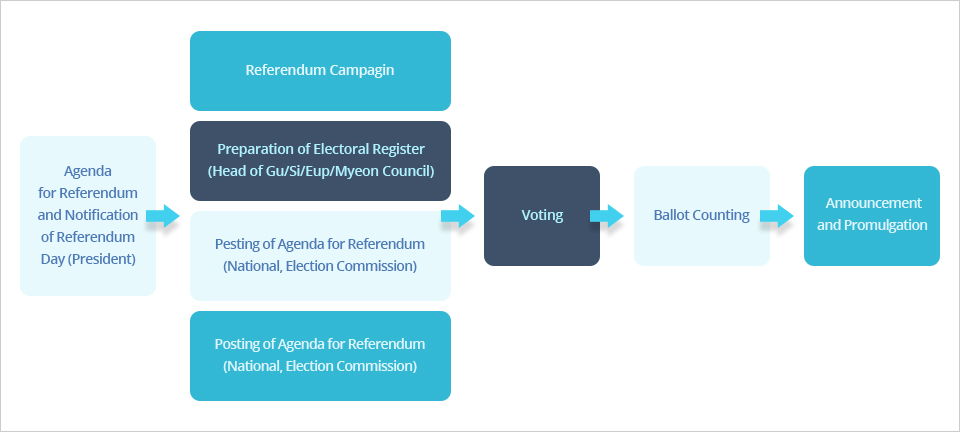National Referendums
- Definition
A referendum is one type of direct democratic system that allows citizens to directly decide important issues facing a nation and that supplements the indirect democratic system in which the representatives of citizens run a nation.
Korea holds referendums on national policies related to diplomacy, national defense, unification, as well as amendments in accordance with the Constitution. - Constitution and Laws
AArticle 72 of the Constitution describes 'The president may submit to a national referendum important policies relating to diplomacy, national defense, unification and other matters relating to a national destiny if he/she deems it necessary'.
Article 130 Clause 2 describes 'The proposed amendments to the Constitution shall be submitted to a national referendum not later than thirty days after being passed by the National Assembly, and shall be determined by more than a half of all votes cast by more than a half of the voters eligible to vote for the National Assembly members.' The above indicates that referendums are based on the Constitution and the National Referendum Act. - Process

- Agenda for Referendum and Notification of Referendum Day
If the president may submit to a national referendum important policies relating to diplomacy, national defense, unification, and other matters relating to a national destiny or amendments of the Constitution, he/she shall announce the date of referendum and the referendum agenda no later than 18 days before the referendum day. Important policies relating to diplomacy, national defense, unification, and other matters relating to a national destiny shall be notified no later than 18 days before the referendum day, and amendments of the Constitution shall be notified for over 20 days from the day the amendments are proposed.
- Posting of Agenda for Referendum
If the president notifies the referendum agenda and the date of referendum, the National Election Commission will prepare and post the referendum agenda no later than five days from the date of notification to allow voters to identify the referendum agenda notified.
- Preparation/Delivery of Referendum Campaign Leaflets
Referendum campaign leaflets are issued to allow voters to identify the proposed cause for and the description and process of a referendum, and the Gu/Si/Gun Election Commission produces referendum campaign leaflets under the preparation plan of the National Election Commission and delivers them to the reported absentees no later than 5 days after the date for confirmation of the list of reported absentees and also to the general voters no later than 4 days before voting day.
- Referendum Campaigns
Referendum campaigns allow voters to either agree or disagree on the issue of a referendum, and anyone who is eligible to be a member of a political party may perform referendum campaigns from the notification date for Referendum voting day to one day before the Referendum voting day. The Election Commission actively provides guidance and performs promotion for voters and those performing referendum campaigns for fair referendums.
- Preparation of Voters List and Management of Voting/Ballot Counting
Preparation of electoral register and management of voting/ballot counting are similar to those in case of general elections.
- Announcement and Promulgation
The National Election Commission responsible for counting the total number of votes announces the voting result and notifies the result to the president and the speaker of National Assembly.
Then, the president promulgates the result to citizens immediately.
- Agenda for Referendum and Notification of Referendum Day
- Voter Turnout
Voter Turnout Category Date Turnout 1 Dec 17, 1962 85.3% 2 Oct 17, 1969 77.1% 3 Nov 11, 1972 91.9% 4 Feb 12, 1975 79.8% 5 Oct 22, 1980 95.5% 6 Oct 27, 1987 78.2%